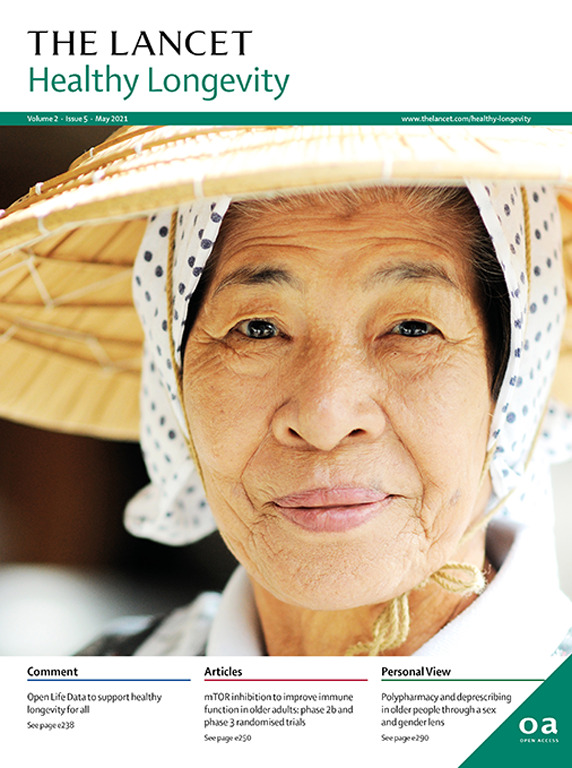综合身心体育锻炼、认知训练和护士引导的危险因素调整以增强初级保健中轻度认知障碍老年人的认知:一项三组随机对照试验
IF 14.6
Q1 GERIATRICS & GERONTOLOGY
引用次数: 0
摘要
轻度认知障碍是一种认知状态,它比健康老年人的认知状态更差,但没有痴呆严重。护士主导的风险因素修改(RFM)干预对轻度认知障碍老年人的有效性尚不清楚。本研究旨在比较:(1)多成分干预:联合认知训练、身心体育锻炼和护士主导的RFM(心肺复苏术),(2)护士主导的RFM单独,(3)健康建议单独对初级保健中轻度认知障碍的老年人认知功能的影响。方法:我们在香港Lek Yuen健康中心的大学附属研究和培训诊所进行了一项为期15个月、三组、开放标签、盲终点、随机对照的轻度认知障碍老年人试验。纳入标准为年龄60-80岁,香港蒙特利尔认知评估得分为19-25分(定义为轻度认知障碍),身体状况稳定。参与者通过计算机生成的分配顺序随机分配(1:1:1),接受心肺复苏术、RFM或健康建议。评估员和数据分析师对分组分配不知情。随机分配到CPR组和RFM组的参与者每季度与护士见一次面,每6个月与初级保健医生见一次面。心肺复苏术组还接受太极和认知训练,每周三次,持续3个月。健康建议组收到了一般健康建议的小册子。在基线、6个月、12个月和15个月时进行评估。主要终点是15个月时阿尔茨海默病评估量表-认知部分(ADAS-Cog) Z评分。分析遵循修改后的意向治疗原则,包括参与者完成至少一次随访评估。使用线性混合模型进行分析,并使用Bonferroni校正对多个比较进行调整。该试验已在中国临床试验注册中心(ChiCTR 1900026857)预注册,并已完成。在2019年10月28日至2022年12月1日期间,收到了3122份报名,1104份被排除(拒绝参加、重复报名或无法联系),2018年被评估为合格。另外1562名参与者被排除在外,456名参与者被随机分配到干预组。152名参与者被分配到CPR组,152名参与者被分配到RFM组,152名参与者被分配到健康建议组。423名至少完成了一次随访评估的参与者被纳入分析(心肺复苏术组139人,RFM组144人,健康咨询组140人)。118人(28%)为男性,305人(72%)为女性。参与者的平均年龄为70.1岁(SD为4.9)。在主要终点15个月时,三组间ADAS-Cog无显著差异(CPR vs健康建议,β= - 0.04 [95% CI - 0.34 ~ 0.26];RFM vs健康建议,β= - 0.14 [- 0.44 ~ 0.15];CPR与RFM, β= 0.10[- 0.19 ~ 0.40]), 6个月和12个月随访时也没有。在健康建议的基础上,对轻度认知障碍患者的新干预措施只有在经过改进并通过未来的试验评估为有效时才应推荐。卫生及医学研究基金本文章由计算机程序翻译,如有差异,请以英文原文为准。
Combined mind–body physical exercise, cognitive training, and nurse-led risk factor modification to enhance cognition among older adults with mild cognitive impairment in primary care: a three-arm randomised controlled trial
Background
Mild cognitive impairment is a cognitive state that is worse than that of healthy older adults but less severe than dementia. The effectiveness of a nurse-led risk factor modification (RFM) intervention for older adults with mild cognitive impairment is unclear. The study aimed to compare the effects of: (1) a multi-component intervention: combined cognitive training, mind–body physical exercise, and nurse-led RFM (CPR), (2) nurse-led RFM alone, and (3) health advice alone on cognitive function among older adults with mild cognitive impairment in primary care.
Methods
We did a 15-month, three-arm, open-label, blinded-endpoint, randomised controlled trial in older adults with mild cognitive impairment at a university-affiliated research and training clinic of the Lek Yuen Health Centre in Hong Kong. Inclusion criteria were age 60–80 years, a Hong Kong Montreal Cognitive Assessment score of 19–25 (defined as mild cognitive impairment), and a physically stable condition. Participants were randomly assigned (1:1:1) via computer-generated allocation sequencing to receive either CPR, RFM, or health advice. Assessors and data analysts were masked to group allocation. Participants randomly assigned to the CPR and RFM groups met the nurse quarterly and the primary care physician every 6 months. The CPR group also received Tai Chi and cognitive training three times a week for 3 months. The health advice group received booklets with general health advice. Assessments were conducted at baseline, 6 months, 12 months, and 15 months. The primary outcome was the Alzheimer’s Disease Assessment Scale-Cognitive section (ADAS-Cog) Z score at 15 months. The analysis followed the modified intention-to-treat principle that included participants completing at least one follow-up assessment. A linear mixed model was used for the analysis, with adjustments for multiple comparisons made using Bonferroni’s correction. The trial was preregistered at the Chinese Clinical Trial Registry (ChiCTR 1900026857), and is completed.
Findings
Between Oct 28, 2019, and Dec 1, 2022, 3122 registrations were received, 1104 were excluded (declined to participate, duplicate registrations, or unable to be contacted), and 2018 were assessed for eligibility. A further 1562 participants were excluded, and 456 participants were randomly assigned to an intervention. 152 participants were assigned to the CPR group, 152 to the RFM group, and 152 to the health advice group. 423 participants who completed at least one follow-up assessment were included in the analysis (139 in the CPR group, 144 in the RFM group, and 140 in the health advice group). 118 (28%) participants were male and 305 (72%) were female. The mean age of participants was 70·1 years (SD 4·9). No significant difference between the three groups in ADAS-Cog was found at the primary endpoint at 15 months (CPR vs health advice, β= –0·04 [95% CI –0·34 to 0·26]; RFM vs health advice, β= –0·14 [–0·44 to 0·15]; CPR vs RFM, β=0·10 [–0·19 to 0·40]) nor at the 6-month and 12-month follow-ups.
Interpretation
New interventions for patients with mild cognitive impairment on top of health advice should be recommended only when they have been refined and evaluated to be effective by future trials.
Funding
Health and Medical Research Fund.
求助全文
通过发布文献求助,成功后即可免费获取论文全文。
去求助
来源期刊

Lancet Healthy Longevity
GERIATRICS & GERONTOLOGY-
CiteScore
16.30
自引率
2.30%
发文量
192
审稿时长
12 weeks
期刊介绍:
The Lancet Healthy Longevity, a gold open-access journal, focuses on clinically-relevant longevity and healthy aging research. It covers early-stage clinical research on aging mechanisms, epidemiological studies, and societal research on changing populations. The journal includes clinical trials across disciplines, particularly in gerontology and age-specific clinical guidelines. In line with the Lancet family tradition, it advocates for the rights of all to healthy lives, emphasizing original research likely to impact clinical practice or thinking. Clinical and policy reviews also contribute to shaping the discourse in this rapidly growing discipline.
 求助内容:
求助内容: 应助结果提醒方式:
应助结果提醒方式:


